
Asian Stocks Climb With Focus on Mideast Truce: Markets Wrap
(Bloomberg) — Stocks in Asia edged higher as the Israel-Iran truce appeared to hold and Treasury traders ramped up bets for US interest rate cuts.
MSCI’s gauge for Asian equities climbed 0.3% on Wednesday following a more than 2% rise in the previous session, when US President Donald Trump announced a ceasefire between the Middle East rivals. US equity futures were little changed after the S&P 500 climbed 1.1% and the Nasdaq 100 rose 1.5% on Tuesday, notching its first record since February.
Treasuries and a gauge of the dollar steadied. The benchmark 10-year yield shed five basis points on Tuesday after Federal Reserve Chair Jerome Powell said “many paths are possible” for monetary policy, with data showing weakening consumer confidence. Traders continued to keep a close eye on the Middle East as the nascent peace deal remains precarious. Iran and Israel appeared to honor the agreement after Trump lashed out at both side for early breaches.
“The geopolitical risks have abated but the ceasefire doesn’t exactly look to be ironclad at this stage,” said Tim Waterer, chief market analyst at KCM Trade in Sydney. “The ceasefire has given risk assets a reason to track higher again albeit in a slightly tentative fashion.”
Oil rebounded — after posting the biggest two-day decline since 2022 — as traders assessed the ceasefire and an industry report that pointed to another drop in US crude stockpiles.
The dollar was weaker against most major peers. Asian currencies including the Philippine peso and Indonesia’s rupiah strengthened for a second day. The Australian dollar swung after monthly inflation data missed estimates.
Powell’s remarks before the House Financial Services Committee came on the heels of the Fed’s decision last week to stay on hold. While the Fed chair largely maintained his call for patience as the economy absorbs the impact of trade tariffs, he said that lower inflation and weaker labor hiring could lead to an earlier rate cut.
“If it turns out that inflation pressures do remain contained, then we will get to a place where we cut rates, sooner rather than later,” Powell told lawmakers in response to a question about the possibility of a July move. “But I wouldn’t want to point to a particular meeting. I don’t think we need to be in any rush because the economy is still strong.”
Read: Bond Traders Boost Bets That US 10-Year Yield to Dive Toward 4%
Money markets fully priced in two Fed cuts by the end of 2025, with a first move in September far more likely than next month — though bets on a July reduction edged up from last week.
“The Fed will probably wait for a couple of more data points before they are ready to actually cut interest rates,” Chetan Seth, Asia-Pacific equity strategist at Nomura Holdings, said on Bloomberg TV. “I don’t think he will commit until they have more evidence to embark on a rate cut.”
Fed Bank of Minneapolis President Neel Kashkari said officials need more clarity on how tariffs will impact prices even as recent inflation data has been “quite positive.” His New York counterpart John Williams said it’s “entirely appropriate” to hold rates to analyze impacts of policy changes. Fed Governor Michael Barr said he anticipates tariffs will drive up inflation and expressed support for a wait-and-see approach on rates.
Fed Bank of Cleveland chief Beth Hammack said policymakers may hold borrowing costs steady for some time. Meantime, Boston Fed President Susan M. Collins said the modestly restrictive stance is necessary.
Trump on Tuesday surprised both oil traders and officials in his own government by appearing to undermine years of US sanctions on Iran, giving its biggest customer China the green light to carry on buying the Islamic Republic’s oil as he seeks to bolster the ceasefire with Israel.
In Asia, the Bank of Thailand is expected to keep its policy rate steady. South Korea’s bid for a developed-market status hit a setback after MSCI Inc. kept the country in the emerging-market category following a review. Indonesia’s Finance Minister Sri Mulyani Indrawati stressed that the government is committed to fiscal discipline while rolling out the president’s priority programs.
Some of the main moves in markets:
Stocks
- S&P 500 futures were little changed as of 1:23 p.m. Tokyo time
- Nikkei 225 futures (OSE) rose 0.3%
- Japan’s Topix fell 0.2%
- Australia’s S&P/ASX 200 was little changed
- Hong Kong’s Hang Seng rose 0.8%
- The Shanghai Composite rose 0.3%
- Euro Stoxx 50 futures rose 0.2%
Currencies
- The Bloomberg Dollar Spot Index was little changed
- The euro was little changed at $1.1616
- The Japanese yen was little changed at 144.95 per dollar
- The offshore yuan was little changed at 7.1676 per dollar
- The Australian dollar rose 0.1% to $0.6498
- The British pound was unchanged at $1.3615
Cryptocurrencies
- Bitcoin rose 0.1% to $106,276.62
- Ether fell 0.3% to $2,443.94
Bonds
- The yield on 10-year Treasuries was little changed at 4.30%
- Japan’s 10-year yield declined two basis points to 1.395%
- Australia’s 10-year yield declined two basis points to 4.13%
Commodities
- West Texas Intermediate crude rose 1.4% to $65.28 a barrel
- Spot gold rose 0.2% to $3,328.83 an ounce
This story was produced with the assistance of Bloomberg Automation.
–With assistance from Hoi Yuet Woo and Aya Wagatsuma.
©2025 Bloomberg L.P.
Nasdaq 100 Hits Record as Yields Fall on Powell: Markets Wrap
(Bloomberg) — Wall Street bulls drove stocks higher amid easing Middle East tensions and balanced comments from Federal Reserve Chair Jerome Powell on prospects for rate cuts. Treasury yields and the dollar fell. Oil tumbled.
The S&P 500 rose 1.1% and the Nasdaq 100 climbed 1.5%, notching its first record since February. West Texas Intermediate crude plunged nearly 15% over two sessions to settle around $64 a barrel. In late hours, FedEx Corp. forecast a worse-than-expected profit. Money markets fully priced in two Fed cuts by the end of 2025, with a first move in September far more likely than next month — though bets on a July reduction edged up from last week.
Subscribe to the Stock Movers Podcast on Apple, Spotify and other Podcast Platforms.
“If it turns out that inflation pressures do remain contained, then we will get to a place where we cut rates, sooner rather than later,” Powell told lawmakers in response to a question about the possibility of a July move. “But I wouldn’t want to point to a particular meeting. I don’t think we need to be in any rush because the economy is still strong.”
To Andrew Brenner at NatAlliance Securities, Powell was unable to “convince markets of hawkishness.”
“The markets are telling Powell that he will be lowering rates much more quickly than he portrayed today,” Brenner noted. “We just don’t know about July. We would need a weak payroll report.”
Traders continued to keep a very close eye on Middle East developments. Israel and Iran appeared to be honoring a ceasefire agreement unexpectedly announced by US President Donald Trump, after the American leader reacted angrily to early breaches of the deal by both sides.
“Markets are finally breathing again,” said Haris Khurshid, chief investment officer at Karobaar Capital. “The easing in Middle East tensions, paired with Powell striking a more flexible tone, is giving equities room to run and volatility a much-needed pause.”
Powell’s remarks before the House Financial Services Committee came on the heels of the Fed’s decision last week to stay on hold. He reiterated his view that policymakers need not rush to adjust policy, a counter to recent statements from Fed Governors Christopher Waller and Michelle Bowman that signaled the two would be open to lowering rates as soon as July.
At Evercore, Krishna Guha says a “balanced Powell” kept the focus on a September, not a July move.
“For us, the most interesting takeaway was his comment that ‘a couple of cuts or maybe more’ would put the Fed back at neutral,” Guha said. “The sense that policy is only ‘modestly’ restrictive helps justify holding here while the Fed learns more on the tariff impact on both inflation and employment.”
Fed Bank of Minneapolis President Neel Kashkari said officials need more clarity on how tariffs will impact prices even as recent inflation data has been “quite positive.” His New York counterpart John Williams said it’s “entirely appropriate” to hold rates to analyze impacts of policy changes. Fed Governor Michael Barr said he anticipates tariffs will drive up inflation and expressed support for a wait-and-see approach on rates.
Fed Bank of Cleveland chief Beth Hammack said policymakers may hold borrowing costs steady for some time. Meantime, Boston Fed President Susan M. Collins said the modestly restrictive stance is necessary.
Powell also said potential changes to a key capital buffer should bolster banks’ roles as intermediaries in the Treasury market.
Bill Gross has bad news for Treasury bulls, and good news for stock investors.
The billionaire investor warned that the 10-year Treasury yield will struggle to dip below 4.25% as ballooning fiscal deficits and a weaker dollar conspire to keep inflation elevated. On the flipside, according to Gross, equity markets are likely to continue to grind higher driven by the sheer power of the artificial-intelligence era.
“I suggest a ‘little bull market’ for stocks and a ‘little bear market’ for bonds,” the co-founder of Pacific Investment Management Co. wrote in an X post on Tuesday. “Stocks are AI dominated and continue to suggest 1-2% economic growth.”
The risks facing the stock market are swiftly diminishing as economic growth remains solid despite the turmoil from tariffs and geopolitics. Equities have been remarkably resilient over the past two months as the S&P 500 bounced sharply from April lows, putting it less than 1% away from its record high.
“It’s dangerous for investors to overreact on such events which typically turn out to be entry points rather than lasting selloffs,” Barclays Plc strategist Emmanuel Cau said. “This could actually end up as a bullish factor for stocks over the medium term.”
Oil plunged for the second straight day as Trump signaled he wants to keep oil flowing out of Iran after brokering a ceasefire between Tehran and Israel.
Prices have slumped amid the significant deescalation of a conflict that has rocked the energy-rich Middle East. Trump said in a social-media post that China can continue buying Iranian oil and that he hopes the country will also be purchasing “plenty” from the US.
“A lot can happen obviously still happen with this war, so nobody is going to send up a ‘Mission Accomplished’ signal,” said Matt Maley at Miller Tabak. “However, the risks involved with this conflict have certainly fallen meaningfully over the past few days.”
Having said that, Maley says the risk/reward equation is still skewed heavily toward the risk side.
“The stock market is still very expensive at a time where the level growth in the US economy is falling and earnings estimates are falling,” Maley said. “Investors should be careful about assuming that this good news on the geopolitical front is something that will cause the market to rally substantially higher.”
Corporate Highlights:
- Microsoft Corp. will conduct another round of major layoffs in its Xbox division next week as part of a company-wide reorganization.
- US safety investigators pointed to breakdowns in Boeing Co.’s manufacturing processes as well as poor oversight by the US Federal Aviation Administration as key factors that led to a panel blowing off a 737 Max aircraft shortly after takeoff last year.
- McDonald’s Corp. and Krispy Kreme Inc. are ending their partnership after a little more than a year, with the doughnut chain citing cost issues.
- Shares of solar companies surged after a Republican Senator said lawmakers are discussing changes to a provision in Trump’s broad spending bill that would abruptly end tax credits for rooftop panels.
- Cathie Wood is trimming her portfolio after scoring big with her latest bold bet: Circle Internet Group Inc., the stablecoin firm that has seen its shares surge by triple digits since its debut as a public company.
- Uber Technologies Inc. will begin offering its customers driverless Waymo rides in Atlanta, making it the second market, after Austin, where the two companies are teaming up instead of competing against each other.
- Bondholders sought to sell more than $30 billion of notes back to Warner Bros. Discovery Inc., over twice the face value of the debt the company said it would repurchase, according to a statement on Tuesday, as the media giant prepares to overhaul its liabilities and split in two.
- Walmart Inc. is testing dark stores, which resemble retail stores but are closed to the public, as a way to speed up deliveries.
- Target Corp. is testing the delivery of products directly to customers’ homes from factories, said people familiar with the matter, an effort by the big-box retailer to launch a service similar to the Chinese e-commerce platforms Temu and Shein.
- Starbucks Corp. said it’s not currently considering a full sale of its China business, disputing a report from Caixin Global, as the coffee giant battles cheaper local rivals in its second-biggest market.
- BBVA SA’s €14 billion ($16 billion) bid for rival Banco Sabadell SA suffered a major setback after the Spanish government said the two lenders wouldn’t be allowed to integrate their operations for several years.
- Novo Nordisk A/S is hunting for more early-stage deals to pad its pipeline of next-generation obesity drugs, as the drugmaker struggles to fend off rivals in the burgeoning weight-loss market it helped pioneer.
Some of the main moves in markets:
Stocks
- The S&P 500 rose 1.1% as of 4 p.m. New York time
- The Nasdaq 100 rose 1.5%
- The Dow Jones Industrial Average rose 1.2%
- The MSCI World Index rose 1.3%
- Bloomberg Magnificent 7 Total Return Index rose 0.9%
- The Russell 2000 Index rose 1.3%
Currencies
- The Bloomberg Dollar Spot Index fell 0.6%
- The euro rose 0.3% to $1.1614
- The British pound rose 0.7% to $1.3621
- The Japanese yen rose 0.9% to 144.78 per dollar
Cryptocurrencies
- Bitcoin rose 1.8% to $105,709.64
- Ether rose 3.7% to $2,435.43
Bonds
- The yield on 10-year Treasuries declined five basis points to 4.29%
- Germany’s 10-year yield advanced four basis points to 2.54%
- Britain’s 10-year yield declined two basis points to 4.47%
Commodities
- West Texas Intermediate crude fell 5.2% to $64.93 a barrel
- Spot gold fell 1.3% to $3,323.66 an ounce
©2025 Bloomberg L.P.
Picture of the day
An age-old race involving eight-metre-long ladders: the cherry tower in Zug is Switzerland’s oldest living cherry tradition. The cherry season officially opened yesterday.
Switzerland Today
Dear Swiss Abroad
Swiss politicians are being too careless with their data. Sensitive personal information about them has ended up on the darknet – including passwords – partly due to the use of official email addresses for personal affairs.
Meanwhile, the federal government is planning to restrict special protection status for Ukrainian refugees, following a model similar to Norway’s.
I wish you an informative read.
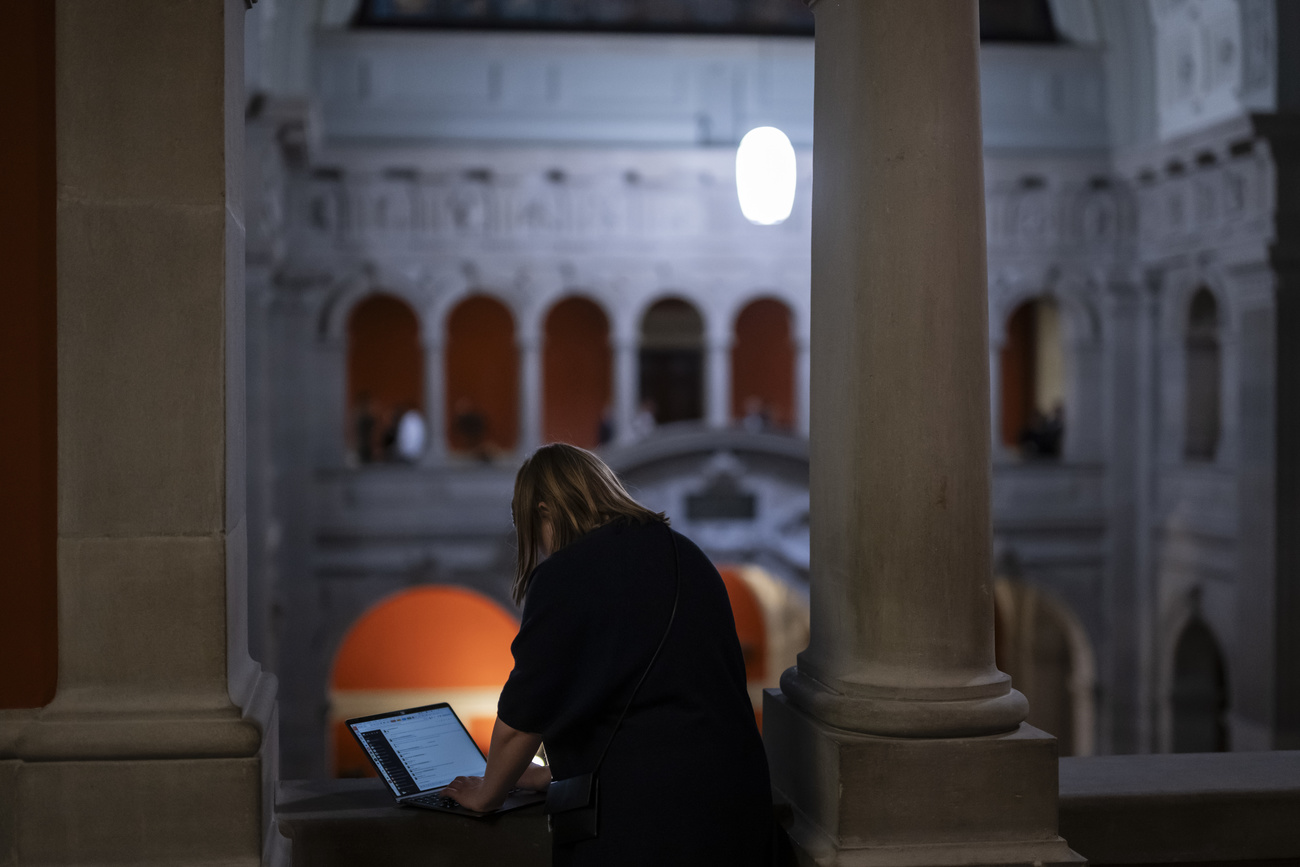
Sensitive data belonging to Swiss politicians has surfaced on the darknet – in some cases, linked to questionable use of official email addresses, according to the Tages-Anzeiger and others.
A joint investigation by Swiss tech company Proton and US firm Constella Intelligence found that around 16% of federal politicians’ personal information has been exposed online, including 44 email accounts and 78 passwords – some unencrypted. These leaks reportedly stem from platforms such as LinkedIn or even dating and erotic sites, with some users using their official parliamentary email addresses.
Proton has not disclosed names but affected individuals have been informed.
Such misuse of official emails carries serious risks: blackmail, reputational damage and potential access to other systems via reused passwords. According to the Tages-Anzeiger, parliamentary services said no official accounts were directly compromised.
Cybersecurity expert Nicolas Mayencourt is calling for a binding code of conduct for politicians, saying security awareness remains too low. He emphasises that tools like password managers, two-factor authentication and clear digital behaviour guidelines can help.
Cybercrime has surged since the Covid-19 pandemic. If cybercriminals were an economy, Mayencourt says, they would rank as the third largest globally.
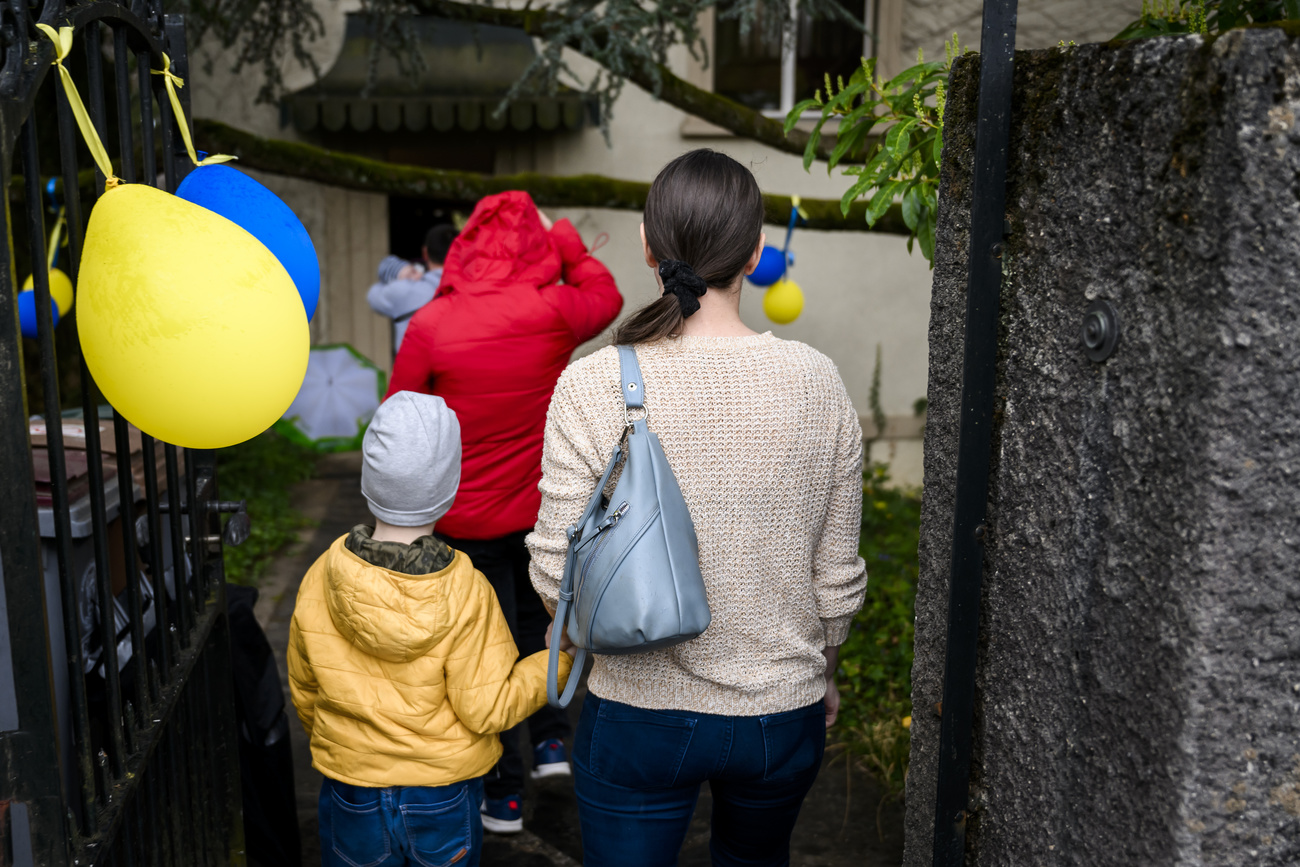
Switzerland is tightening its criteria for granting protection status S to Ukrainian refugees.
As decided by Parliament in December, in future, only those whose last place of residence was in areas occupied or directly affected by hostilities will qualify.
The government is now preparing to implement this policy and is drawing on Norway’s model, according to Swiss public broadcaster, SRF. Like Norway, Switzerland is expected to classify Ukrainian regions as safe or unsafe, with possible adjustments around the capital, Kyiv.
According to the State Secretariat for Migration (SEM), around one-third of Ukrainian refugees currently in Switzerland would no longer qualify for protection status under the new criteria.
The Swiss People’s Party welcomed the move, calling it overdue – and has gone further by proposing to abolish protection status S entirely.
Criticism has come from Swiss Refugee Aid, which warns that the fast-changing security situation in Ukraine could lead to legal uncertainty and unequal treatment in repatriation or asylum processes.

Last November, Swiss voters rejected the proposed motorway expansion with 52.7% voting against it. An audit has now uncovered inconsistencies in data.
An audit by the Swiss Federal Audit Office (SFAO) has now uncovered inconsistencies in the project’s final cost estimates – particularly for the only planned expansion in French-speaking Switzerland.
The project, between Le Vengeron and Nyon, had cost estimates ranging from CHF956 million ($1.18 billion) coming from the Swiss federal government to CHF981 million in its estimate to the Parliament. The discrepancy is attributed to non-transparent internal procedures at the Federal Roads Office (FEDRO) and weak cost forecasting.
Critics had already raised concerns about the figures prior to the vote. They now feel vindicated by the audit, which underlines the importance of reliable, coherent figures – especially for politically sensitive referendums.
The SFAO is recommending systematic cost reviews at all levels. FEDRO has accepted the recommendation.
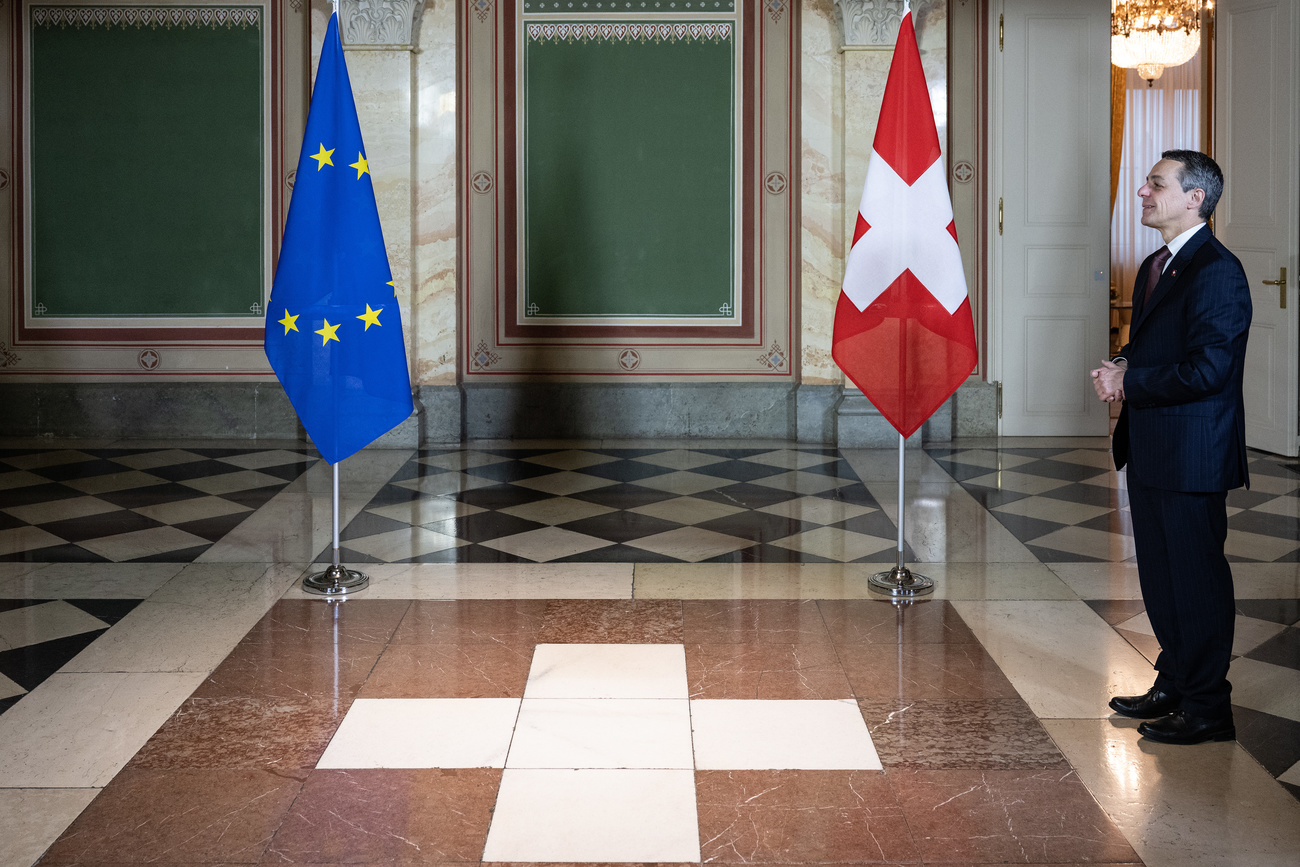
Swiss Foreign Minister Ignazio Cassis and EU Commissioner Maros Sefcovic have signed a joint declaration in Brussels that outlines how Switzerland and the EU will cooperate from the end of 2024 until the new bilateral agreement is ratified.
The declaration includes interim arrangements in key areas such as research, energy, health and transport. Notably, Swiss researchers will regain retroactive access to EU programmes such as Horizon Europe from January 2025.
Other provisions include closer collaboration on grid stability, health protection and participation in the EU Railway Agency. Talks on financial market regulation will also continue.
The bilateral agreements themselves are expected to be signed in early 2026, with the Swiss federal government due to present a draft proposal to Parliament in the first quarter of that year.
Translated from German using DeepL/amva

More
2025 – a dizzying, momentous year so far

More
Patrick Chappatte: ‘The path for satire has been getting narrower’
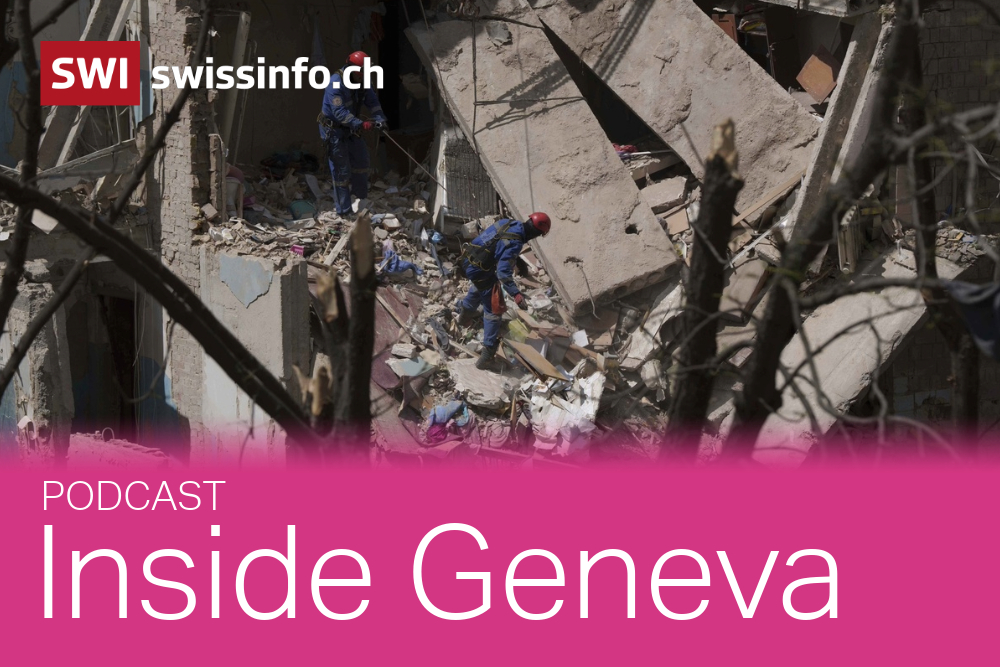
More
War, peace, and cake: the world in 2025

More
Tourist spending in Switzerland grew in 2024
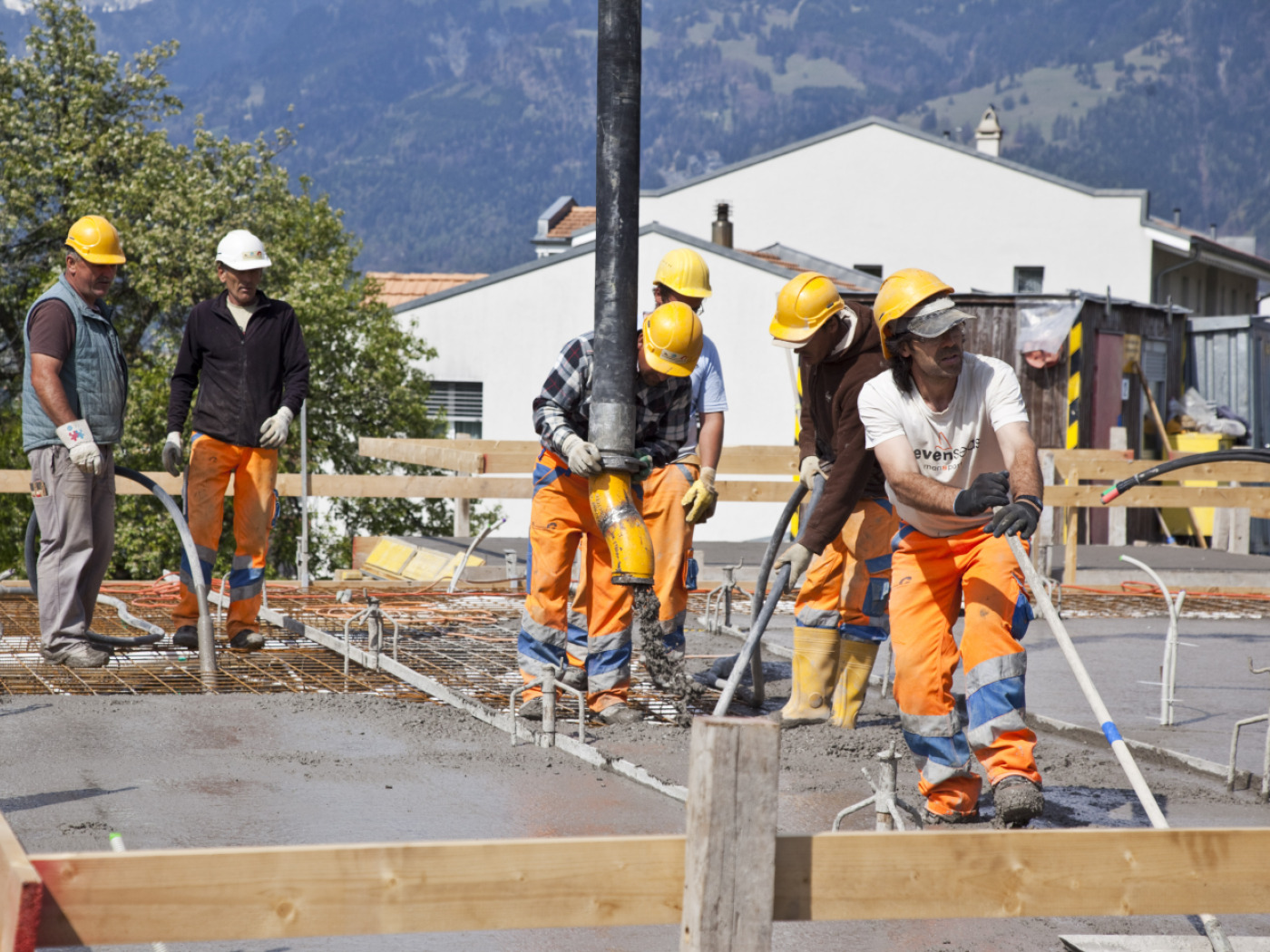
More
Swiss economists lower growth forecast for 2026

More
Survey: more Swiss reject organised religion

More
Tax information when emigrating from Switzerland: what you need to know
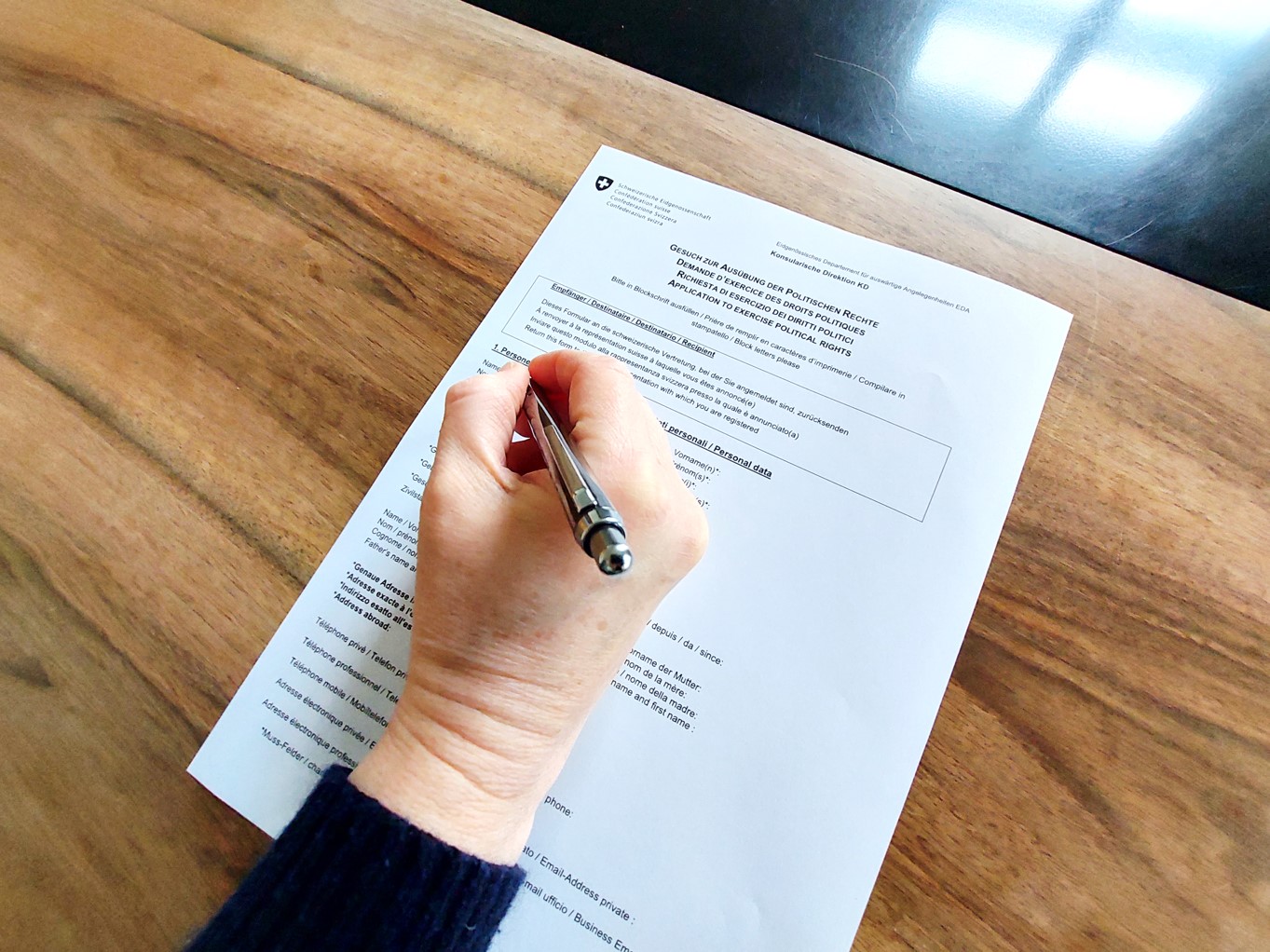
More
Voting from abroad: How to register for Swiss elections

More
What you need to know to get a job abroad
Switzerland in pictures

More
Picture of the day

More
Picture of the day

More
Picture of the week

More
Picture of the day

More
Picture of the day
Let’s talk
News from Switzerland
2025 – a dizzying, momentous year so far
Over the past week or so, I’ve had all sorts of cliches and snatches of songs running round in my head; “what fresh hell can this be?”, for example, a remark the 1920s writer Dorothy Parker used to make when her doorbell rang.
It’s fair to say that 2025 so far has been momentous, and not in a good way. Over the course of this year we’ve tried to bring you some analysis of that on Inside Geneva, from a look at the savage cuts to aid agencies and to the prospects for a fair, sustainable peace in Ukraine and the bloody consequences of blocking the United Nations in Gaza, and replacing it with the inexperienced and ill thought out Gaza Humanitarian Foundation.
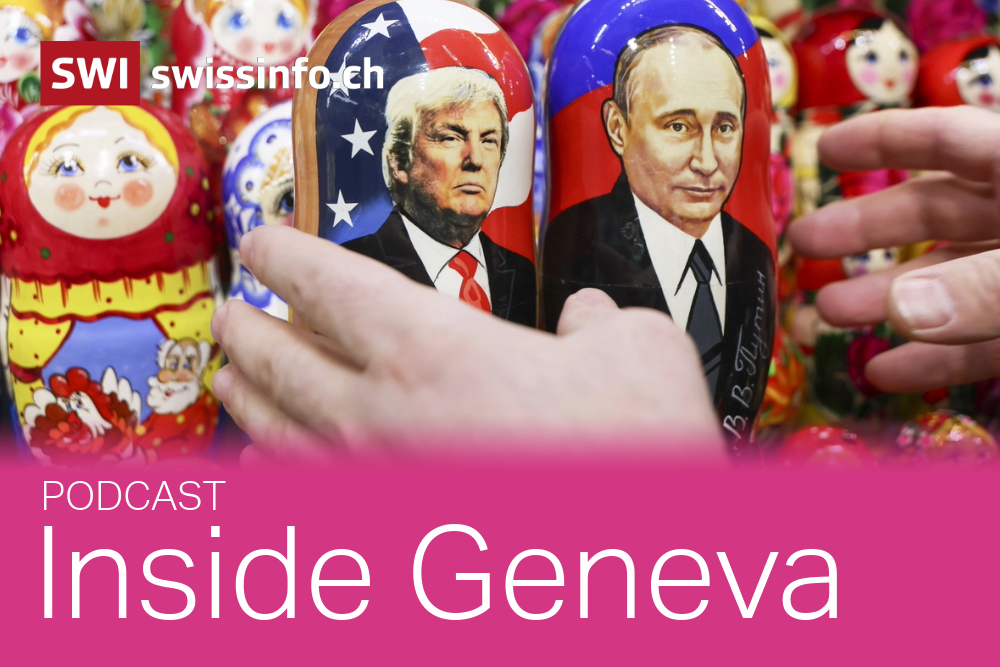
More
US-Russia talks on Ukraine: peace or appeasement?
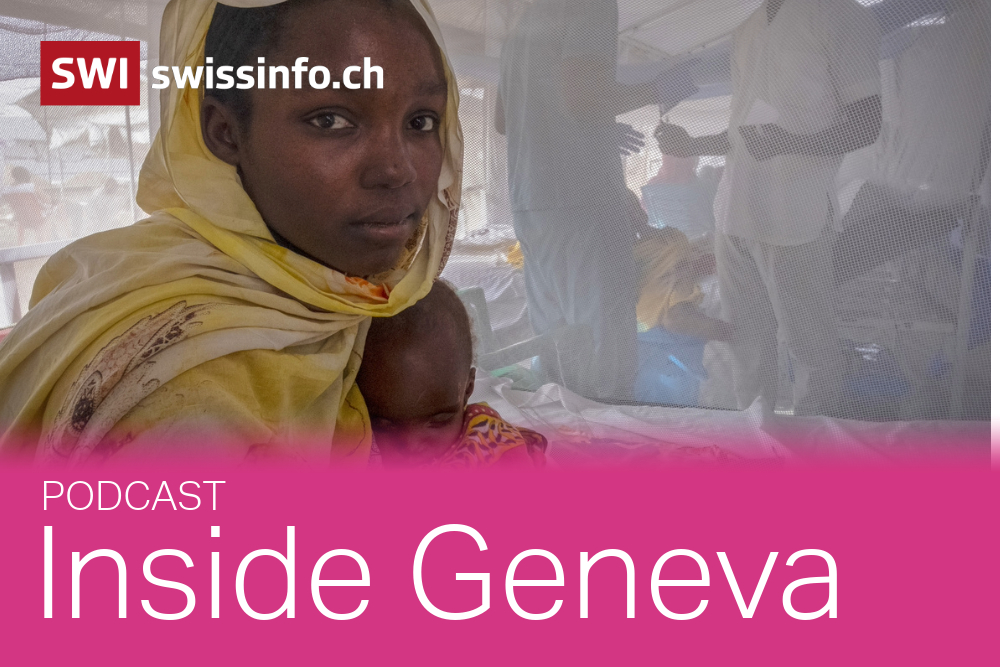
More
Inside Geneva: women, girls and cuts to humanitarian aid
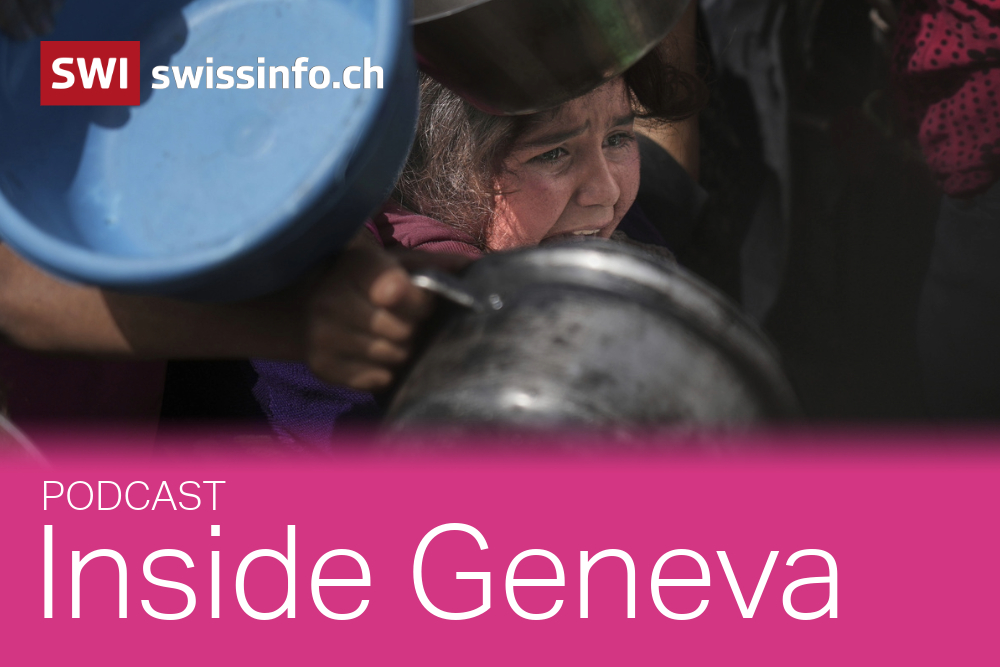
More
Inside Geneva: the failed militarization of humanitarian relief in Gaza
In this week’s podcast I’m joined by journalists Nick Cumming-Bruce and Gunilla von Hall to try to pull some of these issues together, and analyse the year so far. Cumming-Bruce a regular contributor on Geneva topics for the New York Times, sums up the long term damage of the cuts to humanitarian aid.
“What is disturbing is the very casual destruction of international institutions and agreements that have been pulled together over many years, decades of works since World War II”, he tells Inside Geneva. “For all their many imperfections they are trying, with some cases significant success, to address the critical challenges that the world faces.”

More
War, peace, and cake: the world in 2025
The aid cuts, he continues, will cause many deaths in remote, crisis stricken parts of the world, deaths that in many cases will no longer even be recorded. But, he argues, it is time now for other countries to chip in with funding. For decades, humanitarian aid has been mostly paid for “by a small handful of western countries”, with the United States, although not paying as much proportionately as smaller European nations, paying by far the most in pure cash terms.
“Where is China, the world’s second largest economy?” Cumming-Bruce asks, “Or India, or Singapore?”. These thriving economies, he points out, contribute little to humanitarian aid, and when they do, it’s often bilateral rather than through the UN system. So, with the multilateral system under enormous strain, surely it’s time for these countries, if they believe in that system, to step up?
January 20 turning point
But aid cuts are not the only events shaking up international Geneva. There has been the US pull out of the World Health Organisation and the UN Human Rights Council, raising questions over its commitment to the UN altogether – which then in turn raises questions over the survival of the UN, if the world’s premier superpower isn’t engaged.
Should we pin all the upheaval on Washington, and the new Trump administration? von Hall, Geneva based journalist with Swedish newspaper Svenskadagbladet, does see some very negative patterns.
‘‘It all started downhill from 20th of January” she tells Inside Geneva. “The Ukraine war will be over in 24 hours? Nothing happened. It just got worse. Then we had Gaza, then we have Iran, Israel. Then we had the cuts of all the aid. It’s very bleak. I think we should just not give up our hope, but it looks really…well, we’ve got four years.”
Von Hall’s point about the Russia Ukraine war tells us quite a lot about the challenges to the UN, and the multilateral system. The US decided to bypass all traditional diplomatic practice, not seeking UN support, not talking with its European allies, not even really talking to Ukraine, but instead going straight to Moscow to talk to Vladimir Putin, the man who ordered the invasion of Ukraine. The result? Nothing, except increased Russian bombing of Ukrainian cities.
Later in the year, when Israel walked away from the ceasefire in Gaza, and imposed a ten week long aid blockade on Gaza, we saw another example of the UN being by-passed, and another reason that might not be the best idea.
The Gaza Humanitarian Foundation, set up by the US and Israel, was, Donald Trump said “to help the people of Gaza get some food”. In fact, its limited aid distribution points have forced starving people to walk long distances through conflict zones. Hundreds have been shot, and, while the Israeli army largely denies responsibility, as Cumming-Bruce points out “when you’re talking about tank fire, drone fire, fire from even naval vessels at these kinds of gatherings of people, there’s very little doubt how the great majority of these casualties are being caused.”
And, as Chris Lockyear, Secretary General of Médecins Sans Frontières (MSF ) or Doctors without Borders told us in an earlier podcast, delivering aid “is not child’s play. It is not a military operation. It is a different thing that requires years and decades of experience.”
Whiplash
As I write this, a ceasefire between Iran and Israel, proudly announced by the US just hours ago, appears to have unravelled. And that’s just three days after the US bombed Iran’s nuclear facilities, and twelve days after Israel launched its attacks on Iran.
“Whiplash”, as one colleague commented, “doesn’t even begin to describe it.” It’s more than possible, likely even, that things will have changed again before this article is published. That’s the nature of 2025, momentous, volatile, unpredictable, and very dangerous.
But our Inside Geneva discussion does end on a slightly more hopeful note. Von Hall thinks that sooner or later there will be a return to the common sense of the negotiating table. Meanwhile, the aid agencies, many of whose representatives we have interviewed this year on the podcast, are not giving up. Their funds are painfully reduced, but they are still working; in Sudan, Yemen, Afghanistan, DRC, Gaza, Ukraine, and many more places.
Hard though it is, we have to hang on to something positive, and right now, those humanitarian standards and values, the international law we all agreed on after the second world war, are those positive things – so hold them tight!
Edited by Virginie Mangin
Graubünden residents ‘most comfortable’ in Switzerland

The people of Graubünden have the highest level of social well-being in Switzerland, according to a health survey.
+Get the most important news from Switzerland in your inbox
Furthermore, 73.6% of respondents in the eastern canton stated that they felt full of energy and vitality. The Swiss average here was 66.5%.
It is a good testimony to the canton of Graubünden as a place to live: according to the Obsan health survey of 2022, the people of Graubünden not only feel the best in Switzerland, they are also the least depressed, sleep well and feel that they have their lives under control.
+ One in five people in Switzerland does not get enough exercise
For the survey, 1,026 people in the canton were questioned, 533 of them women and 493 men; 868 people were of Swiss nationality, 158 people were of foreign origin. The survey is conducted every five years with people aged 15 and over throughout Switzerland.
More accidents, fewer hospital visits
Some 80.7% of the population of Graubünden said they were physically active. The Swiss average was 76%. However, Graubünden residents also had more accidents. Just under a quarter of them suffered an injury in 2022.
However, they were somewhat more reluctant to use healthcare facilities than the population in Switzerland as a whole. The population of Graubünden was also slightly more cautious when it came to inpatient hospital care. Premiums for compulsory health insurance were almost CHF600 ($740) below the Swiss average.
Translated from German by DeepL/ts
We select the most relevant news for an international audience and use automatic translation tools to translate them into English. A journalist then reviews the translation for clarity and accuracy before publication.
Providing you with automatically translated news gives us the time to write more in-depth articles. The news stories we select have been written and carefully fact-checked by an external editorial team from news agencies such as Bloomberg or Keystone.
If you have any questions about how we work, write to us at english@swissinfo.ch
Swiss price watchdog negotiates lower fees for card payments

Small businesses in Switzerland will have to pay smaller fees for cashless payments from customers over the next few years. The price watchdog has concluded a new agreement with the relevant service provider.
+Get the most important news from Switzerland in your inbox
According to the price watchdog’s estimates, this will lead to annual savings of CHF10-15 million ($12.5-18.5 million) for Swiss retailers, as stated in the newsletter published on Tuesday. Shops such as bakeries, kiosks and restaurants would benefit in particular.
In Switzerland, the financial institution Worldline is the dominant payment processor. It handles the processing and transmission of transactions and credits the corresponding amount to the merchant’s account. Worldline charges a fee for these services.
+ Why the Swiss still like to have cash in hand
In the past, the price watchdog had already reached amicable agreements with the company for lower fees. The last one expired at the end of 2024. A new agreement has now been concluded that is valid until September 30, 2027.
According to the price watchdog, the aim was to reduce the fees for small-value transactions, which are mainly incurred in small shops such as kiosks, bakeries and small grocery shops. This has been achieved with the new agreement.
In the previous summer session, parliament had called for more transparency regarding cashless fees. The government now has the task of creating a legal basis. Small businesses that accept cashless payments should be given clarity for price negotiations and when choosing offers.
Translated from German by DeepL/ts
We select the most relevant news for an international audience and use automatic translation tools to translate them into English. A journalist then reviews the translation for clarity and accuracy before publication.
Providing you with automatically translated news gives us the time to write more in-depth articles. The news stories we select have been written and carefully fact-checked by an external editorial team from news agencies such as Bloomberg or Keystone.
If you have any questions about how we work, write to us at english@swissinfo.ch
Pressure for Trump Trade Deals Ramps Up With Two Weeks to Go
(Bloomberg) — Two weeks from President Donald Trump’s self-imposed deadline to reach deals with the US’s major trading partners, some of the most-watched talks aimed at clinching agreements to avoid higher tariffs are struggling to get over the finish line.
There’s a lot at stake: As of July 9, exporting nations without a bilateral accord in place will face Trump’s so-called “Liberation Day” tariffs that are much higher than the current baseline 10% level applied to most countries.
Only the UK has secured something on paper, though that pact kept the 10% so-called reciprocal rate in place and left unresolved one of Britain’s pain points — 25% steel duties. On a separate track is China, which has a fragile truce with the US that extends into mid-August to give time for negotiations to play out.
Countries engaged in what Washington views as productive discussions may see their deadlines pushed out.
“With the US in some state of negotiation with around 20 countries, it’s increasingly likely that the administration will extend the tariff pause for those it considers to be negotiating in good faith,” said Adam Farrar, senior geoeconomics analyst for Asia-Pacific with Bloomberg Economics.
For dozens of other countries, Trump plans to “set the tariff rate unilaterally in ‘take it or leave it’ deals,” he wrote in a research note. “What the US intends to demand or offer in these arrangements remains unclear.”
QuickTake: A Guide to Trade Talks, Trump-Style
Court challenges to Trump’s legal authority for tariffs have provided an added element of uncertainty for companies that have spent the past 10 weeks either front-loading orders or hoping his threats of higher import taxes are just a negotiating tactic.
Here’s a rundown of where various talks stand:
European Union
The best-case scenario remains an EU-US agreement on principles that would allow the negotiations to continue beyond the early July deadline, Bloomberg has reported. Trump complained last week about the EU talks, threatening to give up and impose unilateral tariffs. The EU, which has been seeking a mutually beneficial deal, will assess any end-result and at that stage decide what level of asymmetry — if any — it’s willing to accept or whether it will push ahead with countermeasures to correct any imbalances.
India
Trade officials from India and the US are still keen to clinch an interim deal before the deadline, but the two sides appear to be digging in their heels on some key issues, particularly on agricultural goods. The US is seeking access to India’s markets for its genetically modified crops, a request India has denied, while New Delhi wants an exemption to the reciprocal tariffs as well as sectoral duties. Indian Prime Minister Narendra Modi missed an opportunity to advance the trade deal with Trump when the US leader left the Group of Seven meeting in Canada earlier than planned last week.
Vietnam
Communist Party chief To Lam is set to lead a delegation of officials and business executives to the US, aiming to meet with Trump and clinch additional deals with US firms to help finalize an agreement. The nation has offered to boost purchases of American products from Boeing airplanes to agricultural goods to get a deal. Negotiators are close to a framework agreement under which Vietnam is pushing for tariffs in the range of 20% to 25%, Bloomberg News previously reported.
Japan
US auto tariffs appear to be the key barrier to a deal between Washington and Prime Minister Shigeru Ishiba’s government, which is bracing for talks to drag on. Trump and Ishiba failed to reach an agreement at the Group of Seven leaders’ summit in Canada, despite holding three prior calls to discuss the tariffs. Opposition leader Yoshihiko Noda said after a meeting with Ishiba that the US is most concerned about the auto trade deficit and that no consensus has been reached. Both sides are now trying to schedule the next round of high-level trade talks. The US is set to raise tariffs on Japan to 24%, on top of existing duties of 25% on cars and 50% on steel and aluminum.
South Korea
South Korea has yet to make meaningful progress in trade negotiations. New Trade Minister Yeo Han-koo met with US officials in Washington on June 23, aiming to secure exemptions from tariffs, including those already imposed on cars and steel. This comes after a planned meeting between President Lee Jae Myung, who took office earlier this month, and Trump at the G-7 summit was called off at the last minute as Trump left the event early amid rising tensions in the Middle East. South Korea faces the risk of a 25% tariff, further squeezing its export-dependent industries already strained by the sectoral duties.
Thailand
Thailand, which has been threatened with a 36% tariff, began its delayed talks with the US last week. Permanent Secretary for Commerce Vuttikrai Leewiraphan said last Wednesday that Thailand’s proposals are good and stand a chance to bring down the tariff to the 10% baseline. The official proposal was submitted to Washington last week and detailed negotiations are underway, the finance minister said Tuesday. The US was Thailand’s largest export market last year, accounting for nearly one-fifth of the country’s total outbound shipments.
Malaysia
Prime Minister Anwar Ibrahim said that Malaysia’s negotiations with the US have been going well after officials met with US Commerce Secretary Howard Lutnick in Washington. Anwar said the imposition of the US tariffs was a “significant challenge” and added that about 60% of semiconductor products from Malaysia was exported to the US alone. Malaysia is seeking to reduce the US tariffs to below 10% for sectors critical to both economies. Both sides have agreed to finalize the talks before the tariff reprieve expires, Malaysia’s trade ministry said this week.
Switzerland
The European nation, also facing among the highest tariff rates of US allies, sketched a compromise around easing market access for some agricultural products, with Economy Minister Guy Parmelin saying he aimed to reach an agreement by early July. Since then, the US Treasury added Switzerland to its list of countries monitored for foreign exchange practices earlier this month. And Trump’s erratic trade policies contributed to the Swiss central bank cutting policy rates by 25 basis points last week after a surge of the franc.
Canada
Targeted with tariffs other than the reciprocal levies, the US’s northern neighbor is seeking to make a deal by mid-July, according to Prime Minister Mark Carney who met Trump on the sidelines of the G-7 meeting. There are still differences between the two nations, according to the US president, who’s complained in the past about undocumented migration and fentanyl issues along the border. Canada is preparing to increase tariffs next month on steel and aluminum — currently at 25% — if talks stall.
Mexico
Mexico and the US were earlier this month nearing a deal that would remove Trump’s 50% tariffs on steel imports up to a certain cap, Bloomberg News reported. President Claudia Sheinbaum expected to meet with Trump soon after their planned encounter was canceled when he departed early from a G-7 summit in Canada. A formal start to the review of the USMCA — the free trade agreement between Canada, US and Mexico — is expected to begin later this year.
–With assistance from Alberto Nardelli.
(Adds Bloomberg Economics remarks in fifth, sixth paragraphs)
©2025 Bloomberg L.P.
Lakes in Central Switzerland have best water quality for bathing

Anyone who swims in a lake in Central Switzerland need have no fear of infection from intestinal bacteria. The water samples taken at 65 bathing sites in 13 lakes all have good to excellent bathing water quality.
+Get the most important news from Switzerland in your inbox
This was announced by the Lake Lucerne Supervisory Commission on Tuesday. According to the press release, there is no need for action based on the results. A recommendation to bathers is not necessary.
The commission carried out the investigation with the Laboratory of the Original Cantons in Brunnen and the Food Control and Consumer Protection Office in Lucerne. It pointed out that only the microbiological quality of the water was examined. Other problems, such as “duck fleas”, had not been taken into account. These are harmless, even if they can cause severe skin itching.
+ Floating through the Swiss capital!
The water samples came from bathing areas in the cantons of Lucerne, Uri, Schwyz, Obwalden and Nidwalden. Around half of the samples were taken in Lake Lucerne, the rest in Lake Zurich, Lake Zug, Lake Sempach, Lake Baldegg, the Rotsee, Lake Lauerz, Lake Sihl, Lake Sarnen, Lake Lunger, Lake Hirschlen, Lake Seelisberg and Lake Golzern.
With regard to bathing in streams and rivers, the press release stated that slightly increased levels of intestinal bacteria could occur in the vicinity of wastewater treatment plants. This is also possible where there are many water birds. Because germs from bird droppings are quickly killed by sunlight, these strains are usually only short-term.
Translated from German by DeepL/ts
We select the most relevant news for an international audience and use automatic translation tools to translate them into English. A journalist then reviews the translation for clarity and accuracy before publication.
Providing you with automatically translated news gives us the time to write more in-depth articles. The news stories we select have been written and carefully fact-checked by an external editorial team from news agencies such as Bloomberg or Keystone.
If you have any questions about how we work, write to us at english@swissinfo.ch
Klaus Schwab in Talks With WEF to Resolve Their Dispute
(Bloomberg) — World Economic Forum founder Klaus Schwab and the organization he led for more than half a century are in talks to end their months-long dispute.
Schwab left the WEF suddenly in April after accusations of financial misconduct emerged and the board called for an investigation, sparking an internal clash. In a joint statement released to Bloomberg News on Tuesday, they said they expect the external probe to be concluded by the end of August.
Such a timeframe would be far faster than a previous investigation into allegations of harassment at the WEF, which began last summer and took about eight months. It would also allow the Forum to focus on preparations for its annual meeting in Davos in January without the scandal hanging over it.
In the meantime, the two sides are in talks to “normalize their relationship in order to safeguard the forum and the legacy of the founder,” according to the emailed statement.
Schwab has denied all claims of misuse of funds and also filed a criminal complaint over the allegations that led to his exit from the Forum. There was no mention of that in the statement.
A fast-track investigation and some reconciliation might also help the board get moving on a new plan to find a successor for the 87-year-old. His early departure — Schwab wanted to stay until early 2027 — scuppered a long-held idea to get European Central Bank President Christine Lagarde for the role of chair, Bloomberg has reported. Lagarde said this month that she was determined to see out her term, which runs until late 2027.
Schwab ran the Geneva-based organization for 50 years and turned its annual Davos meeting into a must-attend event for bankers, business figures and politicians. His exit has sparked intense speculation about who takes over and what it all means for the gathering, which involves days of networking over cocktails and canapes by the world’s business and policymaking elite with a sprinkling of celebrity.
Davos Brand
“The brand is big enough to recover to some extent,” said Howard Davies, former chairman of NatWest Group Plc and the UK’s Financial Services Authority who’s been to Davos more than 20 times. “It will be a setback but most of the people who go there to meet clients and customers won’t really care about it.”
The challenge, in his view, will be to get not just a rockstar from the business or political world but someone also willing to roll up their sleeves to network.
“They will need to replicate him,” Davies said. “Just a figurehead won’t quite do it because he has been super active in getting the top people in,” he says.
The WEF board of directors is currently led by former Nestle SA Chairman Peter Brabeck-Letmathe on an interim basis, and includes global heavyweights such as Blackrock Inc.’s Larry Fink and IMF head Kristalina Georgieva. BlackRock’s Philipp Hildebrand also recently joined, maintaining some Swiss influence at the body.
Schwab’s departure has also prompted a bout of handwringing in Davos. The town was better known for skiing and the sanatorium made famous in Thomas Mann’s novel The Magic Mountain until he brought his conference there in 1971. In 2024, the WEF’s annual revenue amounted to 440 million francs ($543 million), much of that coming from payments and fees from member companies, which then spent generously to host soirees in the Alpine town.
“Of course people in Davos are worried about the future of the WEF now that Schwab is gone,” said Markus Dambach, CEO of Davosworks, a local Forum-focused advertising firm.
Ernst Wyrsch, who once managed Davos’s iconic Grandhotel Belvedere that’s played host to Bill Clinton and Angela Merkel, said “it was for sure a shock for Davos to find out that Klaus Schwab was let go.”
“If the WEF was to leave, that would inevitably press the loser stamp on Davos,” he said in an interview.
Even Schwab himself, who was otherwise full of praise for the advantages the isolated alpine town offered, threatened to relocate the annual meeting because of what he considered to be price-gouging by local businesses.
But Davos’s deputy mayor, Valerie Favre Accola, said she’s received multiple reassurances from the WEF’s board of trustees that the Forum is here to stay. Such assurances were also received by cantonal politicians.
–With assistance from William Shaw and Bastian Benrath-Wright.
(Updates with additional comments on Davos)
©2025 Bloomberg L.P.






















